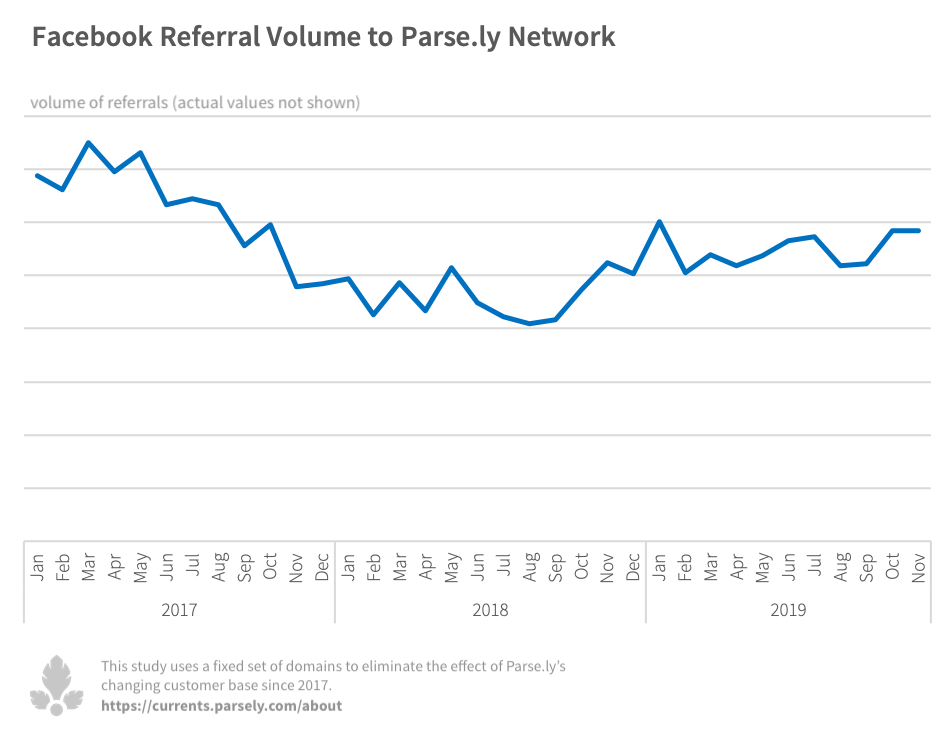
Late last year, Facebook’s head of news partnerships, Campbell Brown, told any news publisher who would listen that publishers should not rely on Facebook to play a major role in their business plans or strategies.
Yet for most of this year, Facebook has acted as one of the most predictable sources of referral traffic available to publishers, according to Parsely data. Through the first 11 months of 2019, the second-largest source of referral traffic online has inched ever so slightly upward, thanks in large part to a significant decline in the month-to-month variability in referrals Facebook delivered to publishers.
The average month-over-month change in the absolute number of referrals from Facebook has been close to flat, going up 0.04%, with standard deviation of 8% (8% increase to 8% drop). That change is down from the average monthly increase of 2% Parsely charted last year, despite the much-publicized deprioritization of publisher content Facebook announced at the beginning of 2018. Yet that overall growth in 2018 came with more volatility, particularly in the first half of the year. The standard deviation Parsely recorded in 2018 was 12% (-10% to 14%). In 2017, the swings ranged from -13% to 7%, with an average month over month change of -3%.
Slow and steady are not sexy descriptors. But after years of referral traffic peaks and valleys, many publishers are happy to see the internet’s second-largest source of referral traffic less likely to deliver unpleasant surprises.
“We see it as a reasonable and reliable partner at this point,” said James Finkelstein, the CEO of politics publisher The Hill. “We’re delighted that Facebook is more and more consistent.”
This trend toward steadiness actually began in August 2018, six months after Facebook announced that it would begin deprioritizing publisher content in its news feed. Many publishers felt a steep drop in referral traffic immediately after that announcement. The drop claimed the lives of several media companies.
Yet after six months of unpredictable peaks and valley, Facebook traffic began increasing with relative steadiness in August 2018. On the whole, the number of referrals Facebook sent to publishers in Parsely’s network rose 14% in 2018.

Today, that steady growth continues, though Facebook referrals remain far below the 2017 heyday. “I don’t think we want to [go back to those levels], considering where it got us,” said Kelsey Arendt, a senior data analyst at Parsely.
In that time, of course, publishers have found other uses for Facebook’s platform since then. Most recently, different publishers have ramped up their spending on Facebook, mostly to distribute commerce content or various subscription offers, both to their readers and to people who look like their readers.
That willingness to pay is one of the reasons for this steadiness, said Leigh Silver, the founder of the marketing consultancy SilverSight Consulting. Where publishers’ Facebook strategies in the past used to be grounded in growth hacking tactics, today they are rooted more in disciplined investment.
“The reason you’re seeing it become more consistent is because back in the day, it was much easier to reach people for free,” Silver said. “You could post [certain popular posts] month over month, week over week, and those would be your traffic drivers. Now that traffic is lower because there’s so many paying.”
Those and other things were part of a host of tricks that publishers used to turn Facebook into a crucial source of traffic. “I hate that it took a big shakeup to wake us up from the growth hacking we’d all gotten used to,” Arendt said.
More in Media

In Graphic Detail: The scale of the challenge facing publishers, politicians eager to damage Google’s adland dominance
Last year was a blowout ad revenue year for Google, despite challenges from several quarters.

Why Walmart is basically a tech company now
The retail giant joined the Nasdaq exchange, also home to technology companies like Amazon, in December.

The Athletic invests in live blogs, video to insulate sports coverage from AI scraping
As the Super Bowl and Winter Olympics collide, The Athletic is leaning into live blogs and video to keeps fans locked in, and AI bots at bay.





